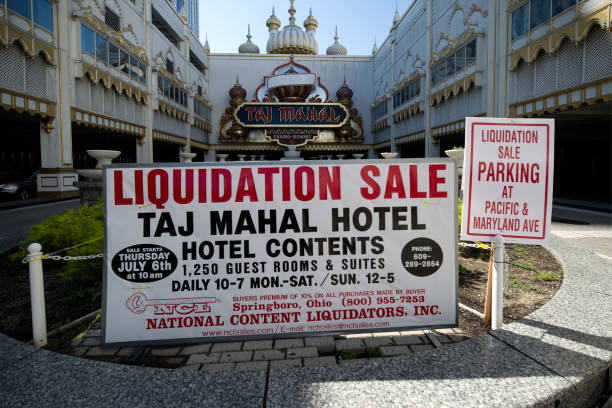It’s hard to bankrupt a casino, but in modern times, Donald Trump and Sam Bankman-Fried have done the near impossible and bankrupted their casinos due to gross mismanagement and their failures to fulfill their customers’ fantasies of getting rich quickly.
In the latest crypto scam, Sam Bankman-Fried, the head of FTX, stole as much as $10 billion from its customers and investors, according to prosecutors. “One prominent cryptocurrency proponent described the verdict as a “new beginning” for the industry — though critics are skeptical that anything has fundamentally changed,” according to the Lever.
This assessment is correct. Stealing $10 billion from customers is par for the course in the crypto world, and nothing has changed. The mystery is what drives people to buy a casino asset that has no assets, no dividends, prices based on supply-demand, and most importantly, hype, and no regulation.
Of course, there are many distinctions between Trump’s Taj Mahal and Bankman-Fried’s FTX “exchange,” aka casino, and his trading firm, Alameda. Still, both cases share more than a hint of fraud perpetrated against investors, bondholders, and the public who put their money and belief in these businesses run by sociopathic fraudsters.
Focusing on Bankman-Fried, his world of crypto was already a shell game. As described many times in articles on this site, cryptocurrency and its coins (Ethereum, Tether, Monero, Dash, Binance, Dogecoin) and other fantasy game names is just a scam for naïve or misinformed speculators on one hand and market manipulators on the other. These two market forces–the informed versus the suckers—meet daily in bidding wars worldwide that push crypto prices around for no reason other than supply and demand, hype versus blandness.
And “for no reason” is the essential problem with crypto that has already cost investors billions. 
As anyone with any investment knowledge knows, crypto is not an asset class. It has no fundamentals, so it cannot be analyzed for future sales, dividends, acquisitions, earnings, or revenues. It is a shell game of hot, uninformed money chasing others seeking hot returns. It is a global gambling table with esoteric, science-fiction fantasy names played by people who ignore established investing knowledge and regulated markets.
Crypto also holds itself out as a form of currency. But the basic belief in any currency is that it has financial backing from nations and central banks. In order to be a medium of exchange, any currency has to be credible “The full faith and credit” clause on US currency carries some weight. Crypto has no credibility, whether it is issued as a Trump NFT coin or an NFT of a poodle.
But, because they wanted to be investment iconoclasts, many innocent and naive investors are now victims of Bankman-Fried and his trading firm and “exchange.” In the process, investors lost hundreds of millions, and they have little chance of ever recovering their losses.
The financial media fails to mention that no regulated stock, futures, or options exchange in U.S. history has ever gone bankrupt. Regulation works. But Republicans hate the rule, and the corporate financial media have adopted that position. Instead, the financial press is often chasing the latest shiny object, such as crypto, companies that have wildly inflated values and no or shaky business models (We Work, ZZZZ Best, Theranos), or fawning over market predictions from the wealthiest people in the world, regardless of how they made their money.
I have worked for two exchanges and consulted with two others. The exchanges and their clearinghouse departments or divisions take their jobs very seriously and straightforward trades in the billions per day. They adjust their trades, matching buyers, sellers, and broken or outtraded businesses, and account for every transaction down to the penny.
Clearing houses are highly automated and audited by outside experts, as well as the internal staff, daily, and have lines of credit already established in the event of a market breakdown (think Oct. 19, 1987, or May 6, 2010), as well as communications with the Federal Reserve in the event of a market meltdown.
Bankman-Fried’s exchange, FTX, seems to have been a garage operation. No one was in charge, and there was no firewall between segregated client accounts and trading firm funds to prevent the dangerous co-mingling of funds. This is clearinghouse management 101, and no regulators noticed the problems.
The Crypto Scam is Global
As discussed on this site many times, crypto-only has a few purposes:
- To destabilize central banks;
- To launder money (from drugs, stolen items, financial frauds);
- To evade taxes;
- To scam greedy, naive individual investors;
- To serve as a placeholder for the expanding world of online sports betting;
- To allow professional investors to make fast, short-term profits via scalping from other naive retail investors.
- To undermine the credibility of banks and the financial system.
Dumb Investors Who Believe False Claims
But to gain legitimacy, crypto hypesters make the false claims that crypto is an asset class, that it is an inflation hedge, and that it is as good an investment as gold. All are false.
In a BBC radio interview today, an FTX client said he lost $2 million when FTX collapsed. The trader said he had no receipts of his trades from Alameda, even though he requested statements a week ago. He said his entire “portfolio” of crypto coins had vanished. He likely lost all of his money.
This trader bought into the crypto hype, but he is not alone. Take the case of a young crypto buyer who told CNBC that he believed “a meme coin,” called unisocks, or $SOCKS, a digital token representing a claim on a physical pair of socks. Yes, he invested in fantasy socks, but you can buy real ones at Marshall’s for $3.
Investing in crypto is also due to a big generational difference. Older investors know there is something odd about an “asset” that has no actual function or substance other than the hope that it will increase in value. This is why Warren Buffet said in this video that if you “offered him all the crypto in the world for $25 he would not take it.”
The popularity of crypto also indicates a failure of the investment industry and the capitalist system to show that traditional stocks, bonds, commodities, options, ETFs, and futures are legitimate, regulated assets that can deliver above-average returns over time if managed in a diversified portfolio. There is no need to push the roulette wheel on crypto that either goes up or down in value based on nothing.
A Nerdy Guy Who Got Greedy
As for Bankman-Fried, his story is about financial fantasies, hot investor money, the power of celebrity endorsements, and fawning, non-critical financial journalists who never bothered to understand the scam or see the big picture. Even the intelligent guys get fooled. Sequoia Capital, for instance, “ran a breathless profile of Bankman-Fried in its magazine. At the time, FTX was valued at $32 billion.”

At age 25, Bankman Fried founded Alameda Research, a crypto investment firm, “after noticing that prices of Bitcoin varied considerably in different countries. According to a BBC report, the arbitrage trading earned Alameda $20 million in three weeks.
“In 2019, he founded FTX, a Hong Kong-based crypto exchange for international investors. Like Elizabeth Holmes – another Silicon Valley billionaire whose star came crashing down – he convinced big-name investors to lend the company not only cash but credibility.”
If we stop to analyze this, Bankman-Fried recognized the arb possibilities between Bitcoin traded in other countries, and he exploited that. Wonderful. This is the same strategy that the Rothschilds used when Napolean lost the battle of Waterloo in 1815, and European currencies and bonds fell in value to the British pound and Gilts. That was 208 years ago.
This paper empire crumbled when an “industry news site, CoinDesk, published a bombshell report alleging that Alameda had over half its $15 billion portfolio in FTT – the crypto token printed by FTX. The disclosure raised questions about the actual value of Alameda’s holdings and the apparent conflict of interest between Alameda and FTX – ostensibly independent companies.”
Using Crypto Money to Buy Senators
Co-mingling customer funds with those of the investment firm is a clear violation of securities laws. Looting the money held in the exchange clearinghouse is outright robbery. Unless the people at FTX or Alameda were in on the theft, anyone with a year’s experience in the financial industry would know this is outright theft.
But in the crypto world, it’s just another scam.
Lastly, the millions in lobbying money spent by others in the crypto world have already purchased some Senators who will give crypto a free pass on some upcoming regulatory relief.
A partial list of Senators who accepted money from FTX include, Debbie Stabenow and John Boozman, who each received $23,200; Sen. Kirsten Gillibrand (D-N.Y.), who received $10,800; Sen. Tina Smith (D-Minn.), who received $5,800; Sen. Cory Booker (D-N.J.), who received $5,700; and Sen. Richard J. Durbin (D-Ill.), who received $2,900; Senate Minority Leader Mitch McConnell (R-Ky.), collected $1.12 million; Sens. John Thune (R-S.D.) $9,200; and Joni Ernst (R-Iowa) $8,700, according to the Washington Post.
The SEC and CFTC have already felt the pressure of the crypto lobby. They are trying to find out how to regulate crypto so traders can pay taxes, be accountable, and not foster a new international money laundering network.
Like sports gambling, dark sites on the Internet, and QAnon, crypto has very dark sides to its existence. No one knows who created crypto or QAnon, and there must be a reason for it. Both are used to destabilize markets, create chaos, move money secretly, and erode trust in established institutions and entire nations.
There is a dark, evil message at work here, and it is operating in plain sight.











